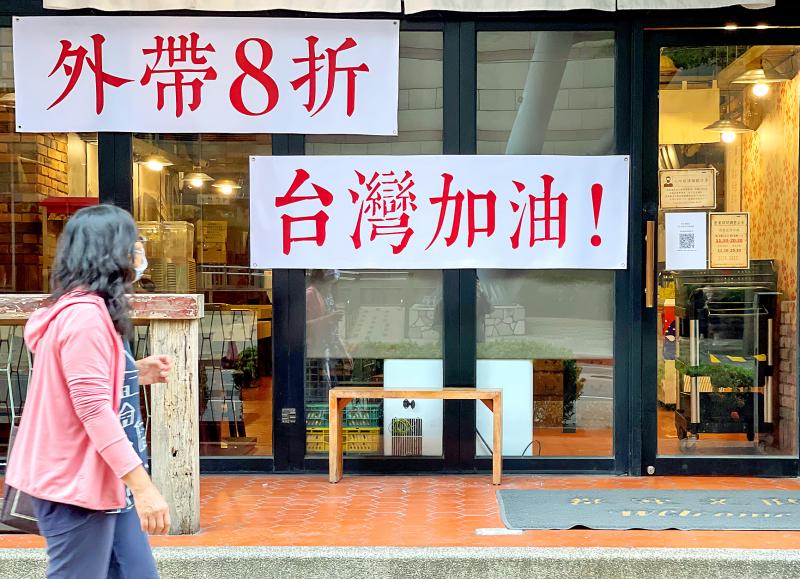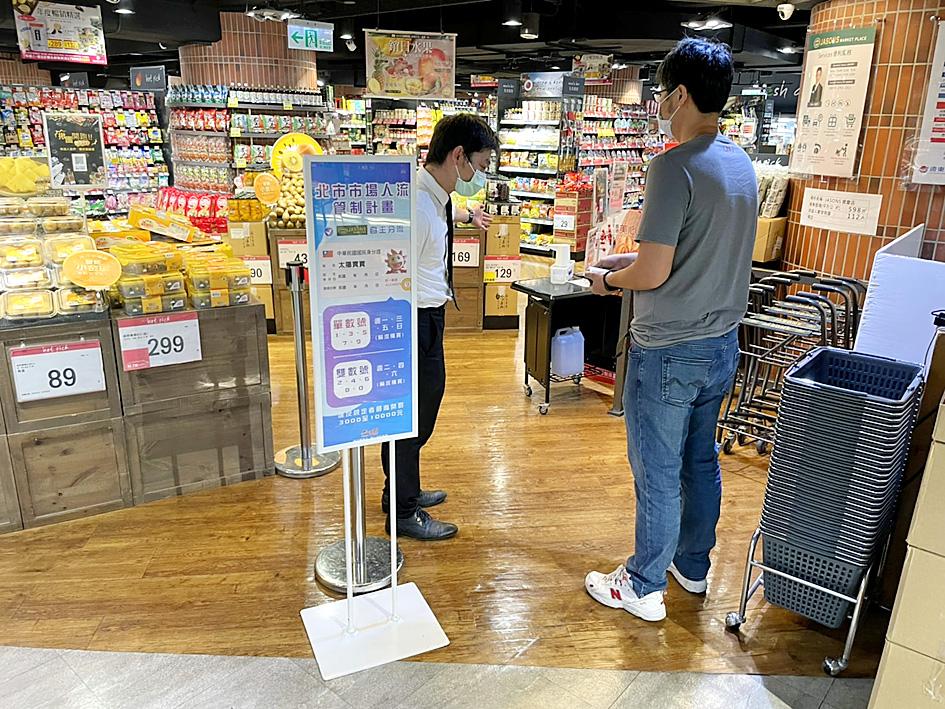The Central Epidemic Command Center (CECC) yesterday announced principles for controlling COVID-19 at supermarkets, convenience stores and other retail outlets, while issuing revised guidance for companies with migrant workers.
The center said that the nationwide level 3 COVID-19 alert would be extended until June 28, meaning that existing disease prevention measures would continue to be enforced, while some enhanced measures would also be implemented.
“The ministry instructs supermarkets, convenience stores, department stores and other shops to thoroughly implement crowd control,” Deputy Minister of Economic Affairs Chen Chern-chyi (陳正祺) said. “We also urge people to buy more per visit and go shopping less often.”

Photo: CNA
Three principles of COVID-19 prevention and control are to be implemented at retail venues, he added.
The first principle is “crowd control,” including clear business hours and a maximum number of people allowed in the store, going by the rule of one person per ping (3.305m2), Chen said.
An employee should be tasked with enforcing a “one in, one out” policy when there are many customers to keep the number below the maximum, and customers should be instructed to practice social distancing inside and outside the store, he said.

Photo courtesy of City’super
The second principle is “entry and exit control,” Chen said.
Stores are encouraged to designate separate entry and exit points, provide alcohol-based sanitizer for customers’ hands, and position employees at entrances to ensure that people register their contact information, have their temperature taken and wear a mask.
The third principle is increased disinfection of store spaces, especially customer restrooms, escalators, elevators, seats, nursery rooms and surfaces more frequently touched by customers, Chen said.
Deputy Minister of Labor Wang An-pang (王安邦) said that while prevention guidelines have already been issued to companies with migrant workers, a few points have been revised.
If an employee is diagnosed with COVID-19, the person’s close work contacts must immediately be identified and placed under home isolation in single rooms with private bathrooms, he said.
If the infected person works at a company with more than one factory site, migrant workers who are not infected and are at the other sites must not be moved to the infected person’s production line or dormitory, Wang said.
Company personnel should be assigned to monitor the infected workers’ health daily, and arrange for those with COVID-19 symptoms to be placed in isolation and tested, he added.
The Ministry of Labor expects to finish inspecting migrant workers’ dormitories at the 1,168 companies that have 50 or more foreign workers by Thursday, Wang said.
It is also allocating funds so that it can offer subsidies to companies that reduce the number of migrant workers per dormitory room by moving some of them to other buildings, hotels or quarantine hotels, he said.
A care center has been established to provide services for migrant workers of King Yuan Electronics, Wang said.
The CECC on Sunday ordered that migrant workers at King Yuan Electronics suspend work and be placed in home isolation, after 195 infections, mostly migrant workers at its factories in Miaoli County, were confirmed.
Translators have been recruited by the center to assist in communicating with the migrant workers, Wang said, adding that they would receive regular care service calls in their native language and receive disease prevention supplies.
The ministry also has Line accounts (LINE@移點通) for sharing government policies and other information with migrant workers in four languages: Indonesian (@1955mw_id), Vietnamese (@1955mw_vn), Thai (@1955mw_th) and English (@1955mw_ph), he said, adding that migrant workers are encouraged to follow the accounts to better understand the latest COVID-19 control policies.

The manufacture of the remaining 28 M1A2T Abrams tanks Taiwan purchased from the US has recently been completed, and they are expected to be delivered within the next one to two months, a source said yesterday. The Ministry of National Defense is arranging cargo ships to transport the tanks to Taiwan as soon as possible, said the source, who is familiar with the matter. The estimated arrival time ranges from late this month to early next month, the source said. The 28 Abrams tanks make up the third and final batch of a total of 108 tanks, valued at about NT$40.5 billion

Travel agencies in Taiwan are working to secure alternative flights for travelers bound for New Zealand for the Lunar New Year holiday, as Air New Zealand workers are set to strike next week. The airline said that it has confirmed that the planned industrial action by its international wide-body cabin crew would go ahead on Thursday and Friday next week. While the Auckland-based carrier pledged to take reasonable measures to mitigate the impact of the workers’ strike, an Air New Zealand flight arriving at Taipei from Auckland on Thursday and another flight departing from Taipei for Auckland on Saturday would have to

A group from the Taiwanese Designers in Australia association yesterday represented Taiwan at the Midsumma Pride March in Melbourne. The march, held in the St. Kilda suburb, is the city’s largest LGBTQIA+ parade and the flagship event of the annual Midsumma Festival. It attracted more than 45,000 spectators who supported the 400 groups and 10,000 marchers that participated this year, the association said. Taiwanese Designers said they organized a team to march for Taiwan this year, joining politicians, government agencies, professionals and community organizations in showing support for LGBTQIA+ people and diverse communities. As the first country in Asia to legalize same-sex

MOTIVES QUESTIONED The PLA considers Xi’s policies toward Taiwan to be driven by personal considerations rather than military assessment, the Epoch Times reports Chinese President Xi Jinping’s (習近平) latest purge of the Chinese People’s Liberation Army (PLA) leadership might have been prompted by the military’s opposition to plans of invading Taiwan, the Epoch Times said. The Chinese military opposes waging war against Taiwan by a large consensus, putting it at odds with Xi’s vision, the Falun Gong-affiliated daily said in a report on Thursday, citing anonymous sources with insight into the PLA’s inner workings. The opposition is not the opinion of a few generals, but a widely shared view among the PLA cadre, the Epoch Times cited them as saying. “Chinese forces know full well that